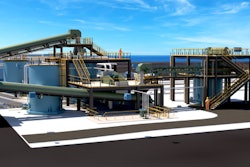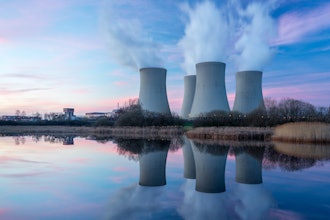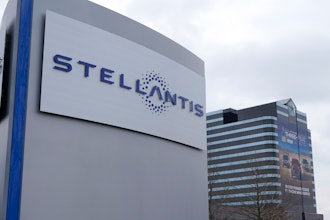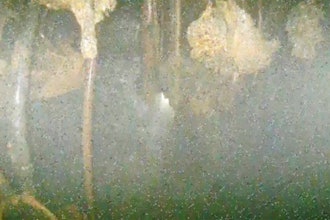Kathleen Rowe said she was more afraid than anyone about going into a coal mine. But one trip two miles underground changed her mind.
"People portray this as a scary job," she said as she toured Paramont's Deep Mine No. 35 in Russell County. "I was one of the most scared of all of us, but once you're here and you experience it, it's not like that. They portray it as being much worse than it is."
Rowe, who teaches fourth grade at Twin Valley Elementary School in Buchanan County, was one of 17 teachers from around the state who've spent the week learning firsthand about the coal industry and how electricity is made in Virginia.
Their week included tours of three mines, a power plant, a coal preparation plant, an equipment manufacturing plant and other facilities related to Virginia's coal industry.
The program, Project Coal to Electricity, is hosted for a week every summer by the Eastern Coal Council and funded by its industry members. This was its 16th year.
Barbara Altizer, the council's executive director, said the goal is to show a positive side of the industry to those who can influence the next generation.
The visits underground made a big impression on Jolene Lambert, who teaches at Jonesville Middle School in Lee County. She, like the others, looked around nervously as they headed downhill through a set of doors, under a low roof strung with lifelines and signs pointing to escape doors.
But deep underground, where the roof is held up with bolts and the walls have a heavy coating of rock dust, she said it was not as dirty or dangerous as she imagined. There were no dusty explosions just a $2 million piece of equipment that grinds the coal out of the rock and monitors the air with computer precision.
"I guess after you get down there and you're working, it's just like you're in a building," Lambert said. "You don't think about how far you are underground, you've got a job to do and you do it."
She said it began as a joke when the miners offered her a chance to try running the equipment but when she enthusiastically volunteered, they let her. She said installing roof bolts, which keep the ceiling from falling in, isn't as hard as it sounds.
"I would've never thought that I could work in the mines," she said. "It wouldn't be my first choice, but I could do it."
More importantly, she said, the experience gives her a base of knowledge to draw from when she's teaching about energy.
One of the group's underground tour guides was John Schoolcraft, a one-time schoolteacher and assistant principal with a master's degree in education who quit to work in an underground coal mine in 1973.
"I made more money as a trainee and general laborer underground than I made as assistant principal at a school of 900," said Schoolcraft, now a senior manager for leadership and organizational effectiveness at Alpha Natural Resources, Paramont's Abingdon, Va.-based parent company.
Schoolcraft said educators are underpaid, especially considering the vast amount of trust placed in them for shaping the nation's future. Coal miners, too, could use a little more appreciation by society, he said.
"We're not pick and shovel people. It's not a black hole in the ground. It's not taking your life in your hands," he said. "The people working here are skilled people. They are not people who are illiterate and can't get a job anywhere else. I think the mainstream media portrays them that way."
He said he's hopeful the teachers, now that they've seen what it's all about, can pass on a more realistic perspective, to their students and the public.
Altizer is open about another industry goal: She hopes the children also grow up to seek jobs in the mines and in related fields, such as chemistry and engineering.
With an average salary of $67,200 a year, Altizer said, coal miners can make good money doing work that, in most cases, doesn't require a college education.
Somewhere under the mountains at Deep Mine No. 35, Superintendent Darrell Holbrook asks everyone to turn off their headlamps, to help the teachers see with new clarity what dark looks like.
"That's what it would be like if we weren't mining coal," Holbrook says.
Jack Richardson, vice president of Central Appalachia operations for Consol Energy, makes a similar illustration in the office of his company's Buchanan Mine, before pointing out that, like half the nation's energy supply, steel can't be made without coal.
"Does anybody here have a car?" he asks. "Does anybody ever go over a bridge? Does anybody ever go in a building that used steel?"
William Fannon, a program participant who teaches agriculture at the Lee County Career and Technical School, said he wants his students to understand that the carbon issue, and a host of proposed legislation, will define their future for better or worse.
Whether it's coal, biomass or ethanol fuel, Fannon said, "carbon is the battery that powers almost everything."
Environmental groups that operate in the area, asked for their take on the coal-to-electricity program, acknowledged that industry has a right to promote its views but they're hopeful the teachers will seek out both sides of the story.
"It would be extremely inappropriate for the school systems to be involved in a program that provides teachers with only one point of view," said Glen Besa, director of the Virginia chapter of the Sierra Club. "Teachers have an obligation to provide the students with all sides of the debate."
Tom Cormons, Virginia director of Appalachian Voices, said teachers should learn about the destructive side of surface mining in Appalachia, including contaminated streams, undrinkable water and disappearing mountain communities.
"Despite the tremendous amount of wealth that's been extracted from the coalfields, when you look at what's going on, on the ground, these are some of the poorest places in the nation despite hundreds of years of destruction," Cormons said. "So it's not the path to a sustainable economic or environmental future for the region."
Besa said the nation must move toward "a clean energy future" to address concerns about mountaintop mining, air pollution and global warming.
Altizer said people have already heard those views and the program for teachers, a rare departure from the coal industry's tendency to avoid the spotlight, is an effort to present "the other side of the story."
___
Information from: Bristol Herald Courier, http://www.bristolnews.com






















